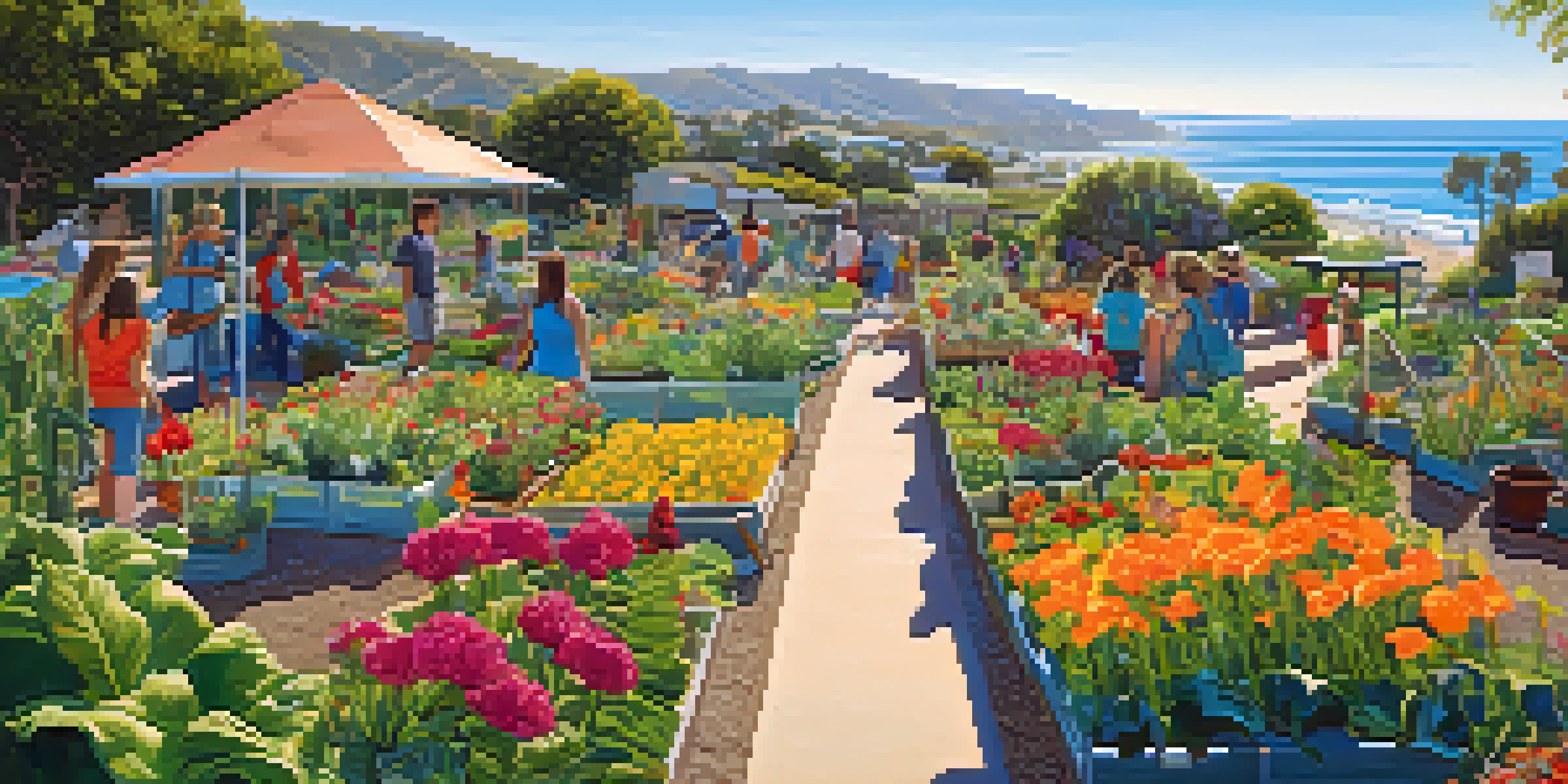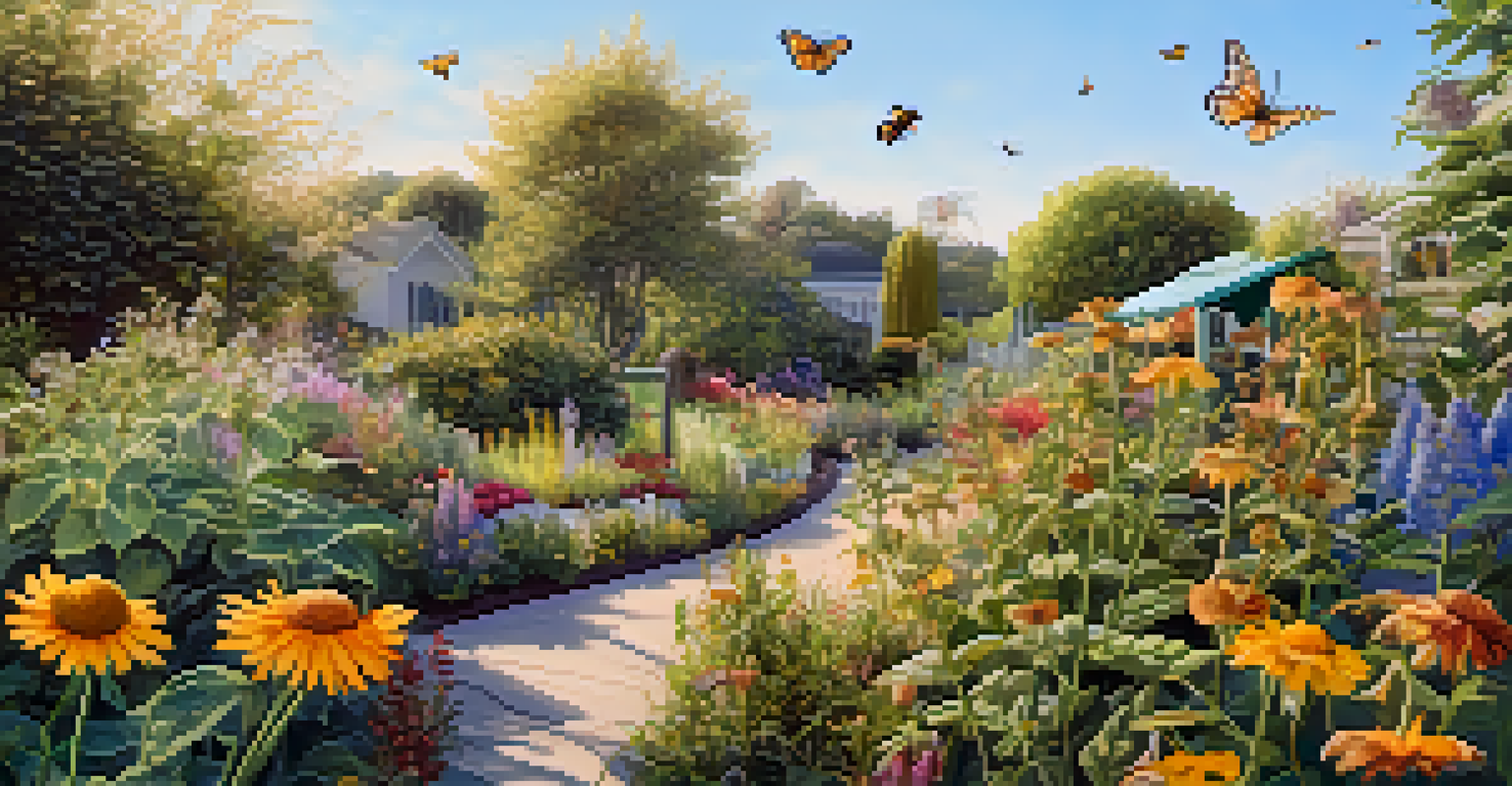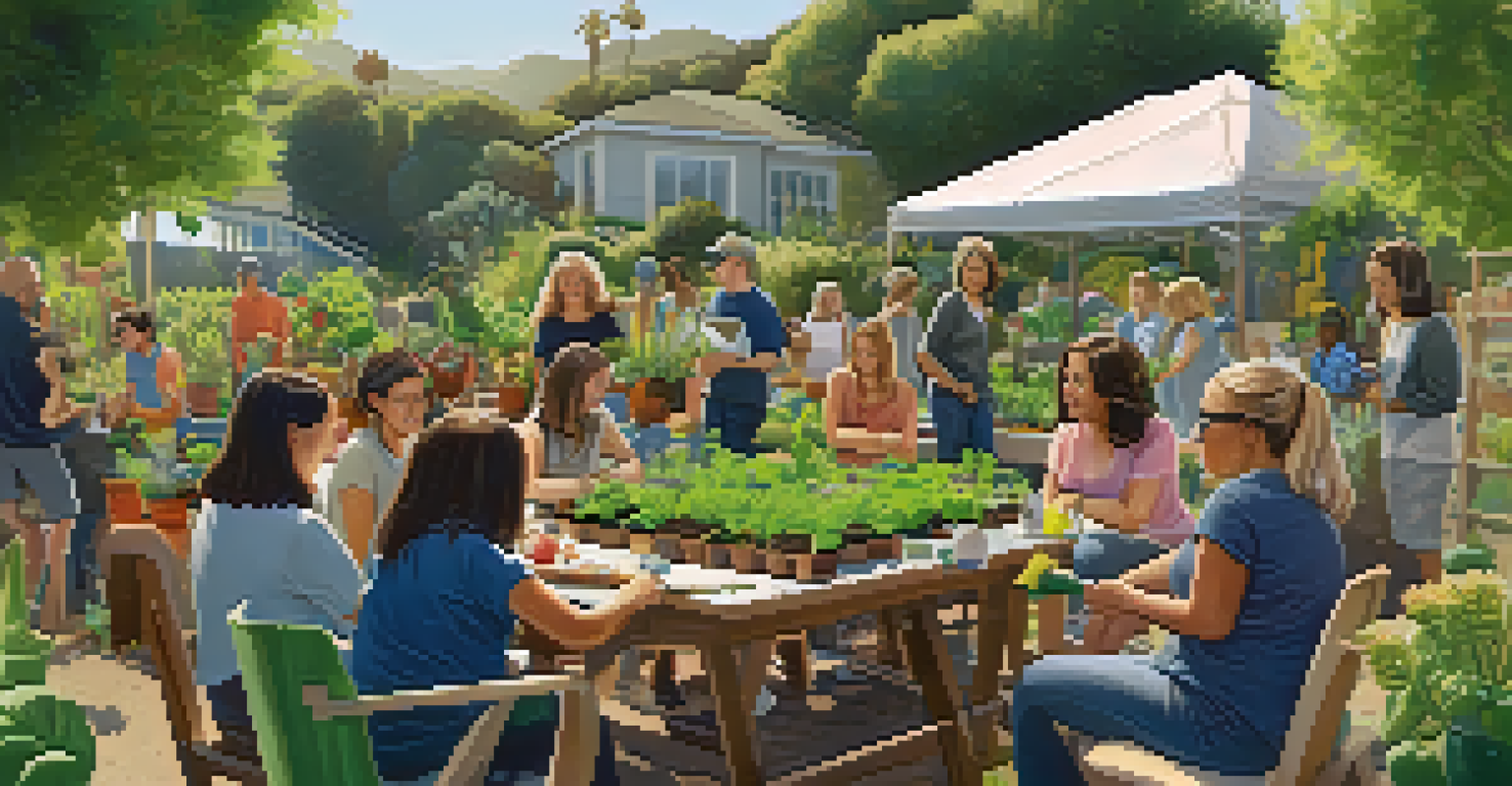The Role of Community Gardens in Malibu's Ecology

Understanding Community Gardens and Their Purpose
Community gardens serve as shared spaces where individuals can cultivate plants, vegetables, and fruits. These gardens are not just about growing food; they foster a sense of community and belonging. By coming together, residents create a supportive environment that promotes social interaction and education about sustainable practices.
The greatness of a community is most accurately measured by the compassionate actions of its members.
In Malibu, these gardens take on a unique role due to the area's coastal climate and rich biodiversity. They allow residents to engage with the local environment, learning about native plants and the importance of biodiversity. This hands-on experience encourages a deeper appreciation for nature and its ecosystems.
Moreover, community gardens can serve as a platform for environmental education. Workshops and events hosted in these gardens often teach sustainable gardening techniques, such as composting and water conservation. This knowledge empowers community members to make environmentally conscious choices in their own backyards.
Enhancing Urban Biodiversity Through Gardens
One of the most significant ecological benefits of community gardens is their contribution to urban biodiversity. By providing habitats for various species, including pollinators like bees and butterflies, these gardens play a crucial role in supporting local ecosystems. In Malibu, where urban development can threaten wildlife, gardens act as sanctuaries for these important creatures.

These gardens often incorporate native plant species, which are better adapted to the local environment and require less maintenance. Native plants also attract local wildlife, creating a balanced ecosystem that thrives on mutual relationships. For instance, a garden with diverse native plants can provide food and shelter for birds, insects, and even small mammals.
Community Gardens Foster Connections
These gardens create spaces for residents to meet, share experiences, and collaborate, enhancing community resilience.
As a result, community gardens not only beautify urban landscapes but also enhance the ecological health of the area. They encourage a symbiotic relationship between residents and nature, reminding us of our role in preserving the environment. The more we nurture these spaces, the more biodiversity we can support.
Mitigating Climate Change Effects with Green Spaces
Community gardens play a vital role in mitigating the effects of climate change in urban areas. By increasing green space, these gardens help absorb carbon dioxide and release oxygen, contributing to better air quality. In Malibu, where the coastal climate can be impacted by rising temperatures, gardens provide a cooling effect as well.
Gardening is not a rational act.
Additionally, gardens can help manage stormwater runoff, an essential factor in coastal regions prone to flooding. By absorbing excess rainwater, they reduce the burden on drainage systems and minimize erosion. This natural method of managing water is not only effective but also sustainable.
Through these practices, community gardens become critical allies in combating climate change. They demonstrate how local actions can lead to positive environmental impacts, inspiring others to consider the ecological footprint of their everyday lives. Each garden planted is a step towards a more sustainable future for Malibu.
Fostering Community Connections and Resilience
Beyond ecological benefits, community gardens foster connections among residents. They create spaces where people can meet, share experiences, and collaborate on projects. This sense of community is especially vital in Malibu, where social ties can enhance resilience against environmental challenges.
Participating in a community garden can also provide individuals with a sense of purpose and accomplishment. Growing food together promotes teamwork and builds friendships, helping to strengthen the fabric of the community. These connections often extend beyond the garden, leading to collaborations on other community initiatives.
Enhancing Urban Biodiversity
Community gardens support local ecosystems by providing habitats for wildlife and incorporating native plants.
In times of crisis, such as natural disasters or economic hardships, these established connections can be invaluable. Neighbors who have worked together in the garden are more likely to support each other, creating a strong network of support. Ultimately, community gardens are not just about plants; they cultivate relationships that enhance community resilience.
Nurturing Educational Opportunities in Gardening
Community gardens serve as important educational hubs, especially for children and families. They provide hands-on learning experiences about the food system, nutrition, and environmental stewardship. In Malibu, local schools often partner with gardens to incorporate gardening into their curriculum, teaching students about sustainability.
Workshops, classes, and events in community gardens offer valuable knowledge on various topics, including organic gardening, permaculture, and environmental conservation. These educational opportunities empower individuals to take charge of their food sources and become more environmentally conscious. For many, it sparks a lifelong passion for gardening and sustainability.
Moreover, these gardens help bridge generational gaps by bringing together people of all ages. Older generations can share their gardening wisdom with younger ones, fostering mentorship and connection. This exchange of knowledge enriches the community and encourages a collective commitment to environmental health.
Promoting Local Food Systems and Sustainability
Community gardens also play a crucial role in promoting local food systems. By growing food locally, these gardens reduce the need for transportation, which in turn lowers carbon emissions. In Malibu, where access to fresh produce can sometimes be limited, community gardens help ensure that residents have access to healthy, locally-grown food.
These gardens can also inspire residents to adopt more sustainable eating habits. When people grow their own food, they become more aware of the importance of seasonal eating and the benefits of organic practices. This awareness can lead to more conscious choices in grocery shopping, further supporting local farmers and reducing environmental impact.
Education Through Gardening
Community gardens serve as educational hubs, offering hands-on learning about sustainability and nutrition for all ages.
Additionally, community gardens often host farmers' markets or food-sharing events, creating opportunities for exchanging surplus produce. This not only supports local economies but also fosters a sense of collaboration within the community. By prioritizing local food systems, community gardens contribute to a more sustainable and resilient food culture.
The Future of Community Gardens in Malibu's Ecology
Looking ahead, the future of community gardens in Malibu's ecology seems promising. As awareness of environmental issues grows, more residents are likely to engage in gardening initiatives. This increased participation can lead to the expansion of existing gardens and the creation of new ones, further enhancing the area's ecological landscape.
Furthermore, local government and organizations are beginning to recognize the value of community gardens in urban planning. By supporting these initiatives, they can help ensure that green spaces remain a priority in Malibu's development. This support can take the form of funding, resources, and educational programs that promote community gardening.

Ultimately, the continued growth of community gardens in Malibu will depend on the collective efforts of residents, local organizations, and policymakers. By working together, they can create a vibrant network of gardens that not only enrich the local ecology but also strengthen community bonds. The future is bright for community gardens, and their impact on Malibu's environment will continue to unfold.